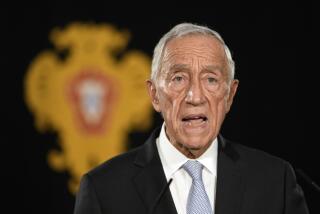Joao Figueiredo; Ended Military Rule in Brazil
- Share via
RIO DE JANEIRO, Brazil — Gen. Joao Baptista Figueiredo, the blunt-spoken president who oversaw his country’s first timid steps toward democracy, died Friday morning of heart and respiratory failure, his doctor said. He was 81.
Figueiredo, who had been hospitalized three times this year with heart, kidney and lung problems, died in his home in the upscale Sao Conrado district, said Dr. Andre Luiz Pitanga.
During his 1978-1985 presidency, Figueiredo sped up the transition from military dictatorship to civilian rule begun by his predecessor, Ernesto Geisel. He also granted amnesty to those accused or convicted of political crimes, allowing hundreds of exiles to return.
He loosened restrictions on political parties, except the Communist Party, and allowed direct elections for state governor in 1982, a move that enabled some opposition figures to regain political power.
At the end of his term, he allowed a civilian government and president to take charge, ending two decades of military regimes that suppressed democratic opposition.
Figueiredo was generally seen as a hard-liner, which led many observers to believe the movement toward democracy was inspired more by an attempt to squelch the growing power of various government intelligence services than anything else.
Figueiredo had headed Brazil’s National Intelligence Service, where most of the dictatorship-era presidents were groomed, from 1974 until he became president in 1978.
When Geisel designated him as his successor in 1978, much attention was paid to Figueiredo’s heritage. His father, the late Gen. Euclydes Figueiredo, helped lead a 1932 revolt that unsuccessfully sought to depose dictator Getulio Vargas and restore democratic rule.
Before he took office, Figueiredo barnstormed the country in a make-believe campaign, leading many Brazilians to see him as a breath of fresh air. He later dropped “general” from his name, went to the market in shirt sleeves to see why Brazilian housewives were paying so much for fruits and vegetables, and released photos of himself doing his daily exercises in a pair of navy blue trunks.
He will probably be remembered more than anything for blunt comments such as: “I prefer the smell of horses to people.” Defenders of the former cavalry officer said this remark stemmed more from a love of horses than a hatred of people.
On his watch, the Brazilian economy began to unravel, with record unemployment and inflation skyrocketing from 43% a year when he took office to 230% a year when he departed. The country also accumulated a massive foreign debt of about $100 billion by 1984, adding Brazil to the growing list of troubled Latin American debtors.
A complex man who enjoyed solving math problems in his free time, Figueiredo had a deep-rooted dislike of politics and politicians. When asked at the end of his term what his lasting legacy would be, he replied: “I hope I am forgotten.” Brazilians largely obliged, leaving him to live quietly in an affluent Rio de Janeiro neighborhood until his death.
Figueiredo is survived by his wife, Dulce, and two children. Funeral arrangements were pending.
More to Read
Sign up for Essential California
The most important California stories and recommendations in your inbox every morning.
You may occasionally receive promotional content from the Los Angeles Times.













